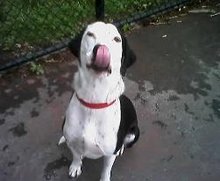Tuesday, May 29, 2007
The heat is on! Protect your pet!!!
Summer heat, the very thing that draws us outdoors, can be very dangerous to our pets. The following tips are important for enjoying the sunshine with the ones we love.
Exercise and Hot Weather
Unlike humans, dogs only dispell heat through their paws and via panting. It is important to limit exposure to daytime heat during the summer.
Long excursions should be limited to the early morning and evening hours. Midday outings should be of shorter lengths. All outings should be accompanied with plenty of rest stops in shady areas and water for your pet. All outings should be scheduled prior to meals.
Most dog supply and camping outfitters carry collapsible bowls that are easy to transport. This and a thermos of cool water are a must during the hot summer months. Be especially sensitive to older and overweight animals in hot weather. Brachycephalic or snub-nosed dogs such as bulldogs, pugs, Boston terriers, Lhasa apsos and shih tzus, as well as those with heart or lung diseases, should be kept cool in air-conditioned rooms as much as possible.
On really hot days, avoid pavement and sand, which absorb the heat and can overheat the dog and burn their pads. Limit walks to shady areas preferably grassy. Dogs that are shaved or have shorter coats can be sunburned and may need a sunscreen. Do not apply any sunscreen or insect repellent product to your pet that is not labeled specifically for use on animals. Ingestion of sunscreen products can result in drooling, diarrhea, excessive thirst and lethargy. The misuse of insect repellent that contains DEET can lead to neurological problems.
In nice weather you may be tempted to take your pet with you in the car while you travel or do errands. But during warm weather, the inside of your car can reach 120° in a matter of minutes, even if you're parked in the shade. This can mean real trouble for your companion animals left in the car. Dogs and cats can't perspire and can only dispel heat by panting and through the pads of their feet. Pets who are left in hot cars even briefly can suffer from heat exhaustion, heat stroke, brain damage, and can even die. Don't think that just because you'll be gone "just a minute" that your pet will be safe while you're gone; even an air conditioned car with the motor off isn't healthy for your pet. To avoid any chance that your pet will succumb to the heat of a car this summer, be sure to play it safe by leaving your pet cool and refreshed at home while you're on the road. And if you do happen to see a pet in a car alone during the hot summer months, alert the management of the store where the car is parked. If the owner does not return promptly, call local animal control or the police department immediately.
Heat Stroke
In summer heat your pet can suffer from heat exhaustion and heat stroke. These conditions are very serious and could cause your pet to die. You should be aware of the signs of heat stress, which could include heavy panting, glazed eyes, a rapid pulse, unsteadiness, a staggering gait, vomiting, or a deep red or purple tongue. If your pet does become overheated, you need to immediately lower his body temperature. Move your pet into the shade and apply cool (not cold) water over his body to gradually lower his core body temperature. Apply cold towels or ice packs to your pet's head, neck, and chest only. Let your pet drink small amounts of water or lick ice cubes. Most importantly, get him to a veterinarian immediately.
Outdoor Parties and Festivals
Don't take your pets to crowded summer events such as concerts or fairs. The loud noises and crowds, combined with the heat, can be stressful and dangerous for pets. For your pet's well being, leave her at home. Be especially aware of these threats during holidays, such as the Fourth of July.
Fleas and Ticks
Another summertime threat is fleas and ticks. Use only flea and tick treatments recommended by your veterinarian. Some over-the-counter flea and tick products can be toxic, even when used according to instructions.
Lawns and Flowers
Summer is often a time when people fertilize their lawns and work in their gardens. But beware: Plant food, fertilizer, and insecticides can be fatal if your pet ingests them. In addition, more than 700 plants can produce physiologically active or toxic substances in sufficient amounts to cause harmful effects in animals.
People, Children and Other Dogs
You have the Stepford dog...congratulations!!! Your dog loves all people, all children and all other dogs. He never walks into a street or goes more than five feet in front of you. That's great...kudos to you as an owner and trainer.
But, what about the dog that's off leash at the house you are about to pass? What about the extremely aggressive dog that is preparing to break through the restraining fence he is behind? What about the group of kids who are preparing to throw fire crackers under his belly? Are you and your dog prepared for that?
The summer months double the challenges for even the best socialized dog. Avoid the challenge and keep your dog restrained.
Subscribe to:
Post Comments (Atom)



No comments:
Post a Comment